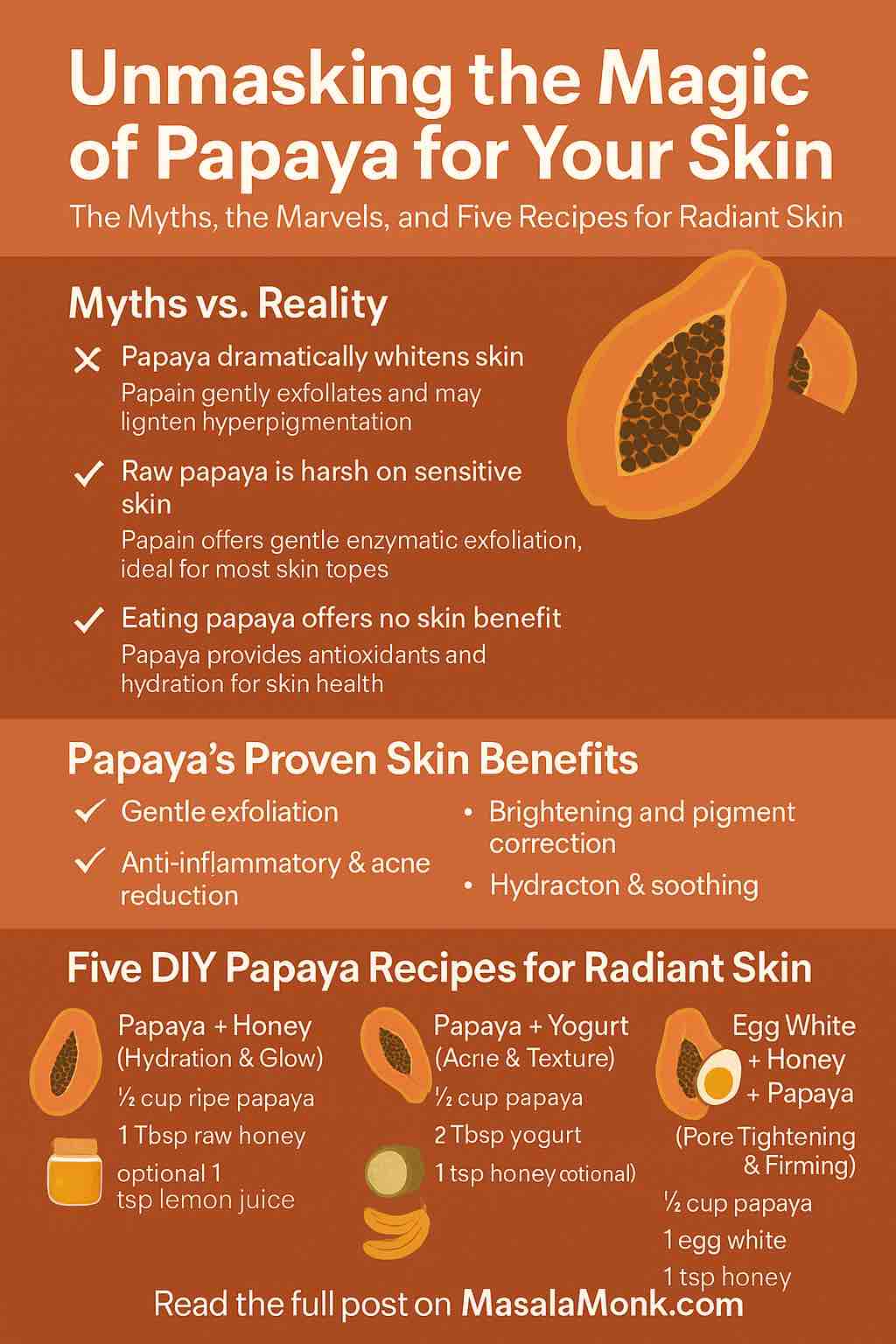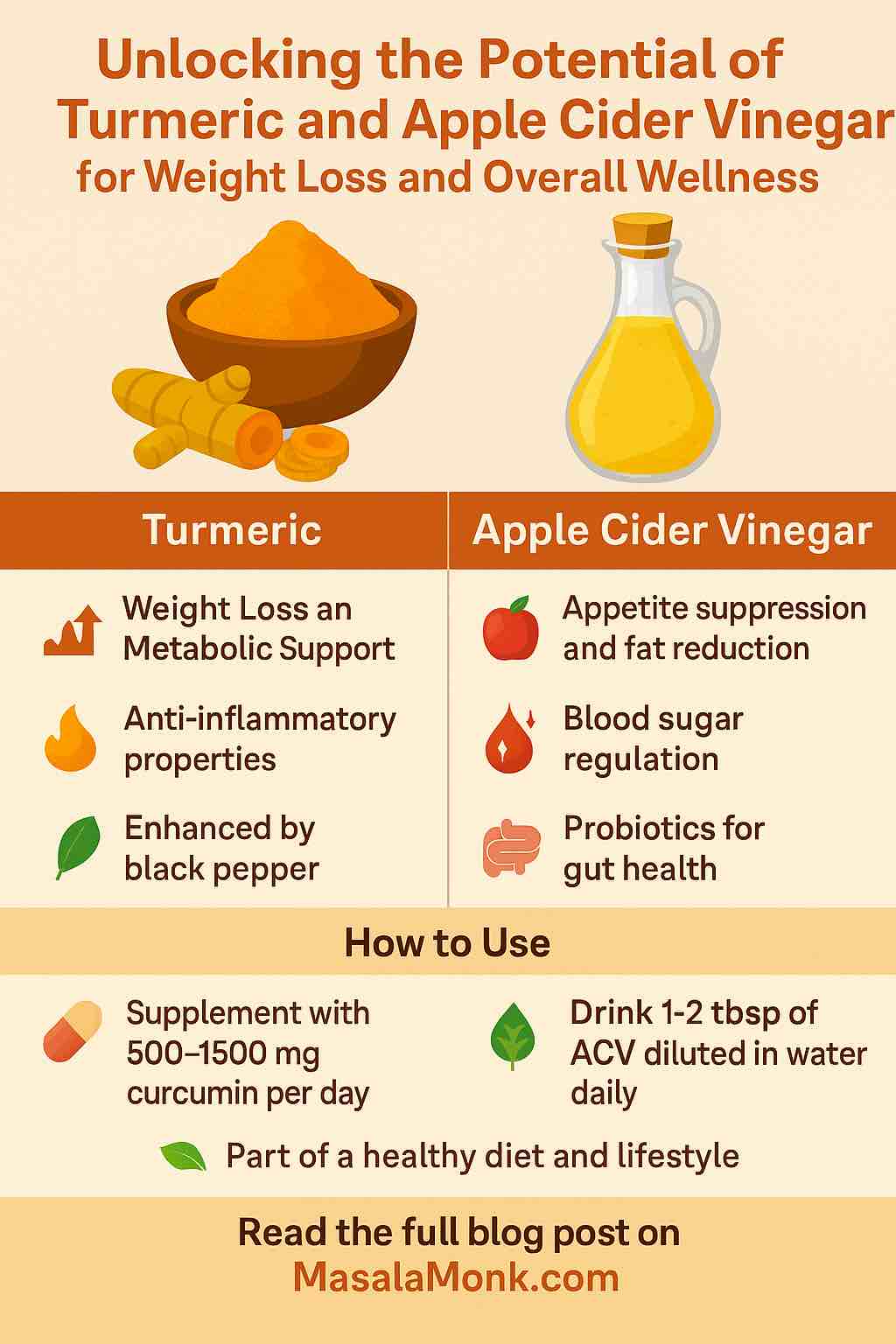
When you think of papaya, you probably imagine a juicy tropical fruit, a breakfast side, or maybe a smoothie ingredient. But did you know this humble orange fruit is a skincare powerhouse? Across generations and continents, papaya has been celebrated as a secret ingredient for glowing, healthy skin—praised in home remedies and even spotlighted by dermatologists.
But what’s real, what’s hype, and what’s the best way to get papaya’s magic working for you? Let’s separate the facts from fiction and unlock five science-backed, easy-to-make papaya recipes for your most radiant skin yet.
Papaya & Your Skin: Unpacking the Marvels
1. Enzymatic Exfoliation—Nature’s Gentle Touch
Papaya contains an enzyme called papain. Think of papain as a microscopic cleaning crew, gently dissolving the dead skin cells that dull your glow. Unlike harsh physical scrubs, papain is gentle—making it safe for most skin types, even sensitive or acne-prone skin.
Why it matters:
Regular exfoliation (done right) reveals fresher, smoother skin, unclogs pores, and lets your serums and moisturizers penetrate deeper.
2. Brightening & Even-Toned Complexion
Papaya is loaded with vitamin C, beta-carotene, and natural AHA (alpha hydroxy acids). These nutrients fight free radicals, fade dark spots, help even out pigmentation, and boost overall skin brightness.
3. Soothing & Anti-Inflammatory Benefits
Both papaya fruit and its leaves have anti-inflammatory properties. This means papaya can calm irritated, sun-stressed, or inflamed skin—a big win for those with redness or mild breakouts.
4. Antioxidant & Anti-Aging Boost
Papaya’s antioxidants—including lycopene, flavonoids, and vitamins A & C—neutralize damaging free radicals, slow down the formation of fine lines, and help keep skin youthful.
5. Hydration & Nourishment
Papaya is 88% water and contains natural sugars and B vitamins. Masks made with papaya leave skin feeling hydrated and plump—never stripped.
Myths vs. Science: What Papaya Can’t Do
With all this magic, it’s tempting to think papaya is a cure-all. But let’s be clear about what the science says:
- Myth: Papaya dramatically whitens skin.
Fact: It can lighten dark spots and hyperpigmentation over time, but it will not bleach your natural skin tone. - Myth: Papaya is too harsh for sensitive skin.
Fact: Papain is gentler than scrubs, but always patch-test, especially if you have allergies or sensitive skin. - Myth: Papaya instantly heals scars or wounds.
Fact: Some medical studies support papaya’s role in wound care, but it’s no miracle fix—don’t skip medical treatment for serious wounds. - Myth: Eating papaya offers no skin benefit.
Fact: Regularly eating papaya supports skin health from the inside—thanks to hydration, antioxidants, and vitamins.
Reader Alert: Who Should Avoid Papaya Masks?
- People with latex allergies (latex-fruit syndrome): Papaya may trigger reactions.
- Anyone with a history of fruit allergies: Always patch-test.
- Pregnant or breastfeeding women: Unripe papaya has been linked to uterine contractions (topical ripe papaya is generally safe, but always consult your doctor).
How to Use Papaya Safely and Effectively
- Frequency: 1–2 times per week is plenty. Overuse can irritate.
- Application: Always start with clean skin.
- Patch Test: Dab a small amount on your jawline. Wait 24 hours.
- Sun Protection: Freshly exfoliated skin is sun-sensitive. Always use SPF.
Five DIY Papaya Recipes for Radiant Skin
Ready to unlock papaya’s power at home? These five tried-and-tested recipes suit a variety of skin needs. All you need is ripe papaya, a few pantry staples, and 20 minutes!
1. Papaya & Honey Hydration Mask
Best for: Dry, dull, or mature skin
- ½ cup ripe papaya (mashed)
- 1 tablespoon raw honey
- Optional: 1 teaspoon lemon juice for extra brightening
How to use:
Mix into a smooth paste, apply to face and neck, leave on for 15–20 minutes, rinse with lukewarm water.
Why it works:
Papain exfoliates, honey hydrates and soothes, lemon helps fade spots.
2. Papaya & Yogurt Gentle Exfoliation Mask
Best for: Oily, acne-prone, or congested skin
- ¼ cup ripe papaya (mashed)
- 2 tablespoons plain yogurt
- 1 teaspoon honey
How to use:
Combine and blend well. Spread on skin, leave for 15 minutes, rinse.
Why it works:
Yogurt contains lactic acid for extra exfoliation and calming.
3. Papaya, Cucumber & Banana Balancing Mask
Best for: Sensitive, combination, or summer-stressed skin
- 2 cubes papaya
- 2 slices cucumber
- 2 slices ripe banana
How to use:
Blend until smooth, apply, relax for 15–20 minutes, rinse.
Why it works:
Cucumber cools, banana nourishes, papaya exfoliates and brightens.
4. Papaya & Egg White Pore-Tightening Mask
Best for: Enlarged pores, dull skin, pre-event glow
- ½ cup ripe papaya (mashed)
- 1 egg white
- 1 teaspoon honey
How to use:
Whisk together, apply, leave for 15 minutes, rinse with cool water.
Why it works:
Egg white firms, papain smooths, honey hydrates.
5. Papaya & Sugar Glow Scrub
Best for: Rough patches, elbows, or body exfoliation
- 3–4 chunks ripe papaya
- 2 tablespoons sugar (brown or white)
How to use:
Mash papaya, add sugar, and gently scrub in circles (avoid face if sensitive). Rinse thoroughly.
Why it works:
Double exfoliation: enzyme + sugar removes stubborn dead cells.
Pro Tips for Every Papaya DIYer
- Don’t over-blend: A little texture is good for mild scrubbing.
- Store leftovers: Keep unused mask in the fridge (use within 48 hours).
- Add-ons: Try a drop of tea tree oil for acne, or aloe vera gel for extra soothing.
- Relax: Use mask time to meditate, breathe, or listen to music—skincare should be self-care!
Conclusion: Is Papaya the Secret to Radiant Skin?
Papaya isn’t a miracle, but it’s a multitasking marvel—gently exfoliating, brightening, hydrating, and calming. Whether you’re a skincare minimalist or love a good pamper session, papaya deserves a spot in your glow-up toolkit.
So, why not pick up a ripe papaya this week and treat yourself to one of these easy recipes? Your skin—and your senses—will thank you.
Want More?
Looking for tailored recipes, more ingredient combos, or help with specific skin concerns? Drop your questions in the comments—let’s get glowing, together!
References:
Frequently Asked Questions (FAQs)
1. Can I use papaya on my face every day?
No. Papaya masks should be used 1–2 times per week. Overuse can lead to irritation or disrupt your skin barrier.
2. Do I need to use ripe or unripe papaya for skincare?
Always use ripe papaya for face masks. Unripe papaya is harsher and can cause irritation or allergies.
3. Will papaya lighten my skin tone?
Papaya can help fade dark spots and pigmentation, but it won’t bleach or drastically lighten your natural skin color.
4. How long should I leave a papaya mask on?
Leave the mask on for 15–20 minutes, then rinse with lukewarm water. Longer is not better, and could increase the risk of irritation.
5. Is it safe to use papaya on sensitive skin?
Generally yes, because papain is gentler than scrubs. But always patch-test first, as some people may still react.
6. Can I use papaya masks if I have acne?
Yes, papaya can help with mild acne thanks to its exfoliating and anti-inflammatory properties. Avoid using on broken or severely irritated skin.
7. Are there any side effects to using papaya on skin?
Possible side effects include redness, itching, or allergy—especially if you have latex or fruit allergies. Always do a patch test.
8. Should I apply moisturizer or sunscreen after a papaya mask?
Yes! Always follow up with moisturizer to rehydrate your skin and sunscreen if you’ll be exposed to sunlight, as fresh skin is more sun-sensitive.
9. Can I store leftover papaya mask?
Yes, refrigerate leftovers in a sealed container and use within 48 hours for best results.
10. What should I do if I get a rash or burning after using papaya?
Rinse immediately with cool water, avoid further use, and apply a gentle moisturizer. If symptoms persist or are severe, consult a dermatologist.













